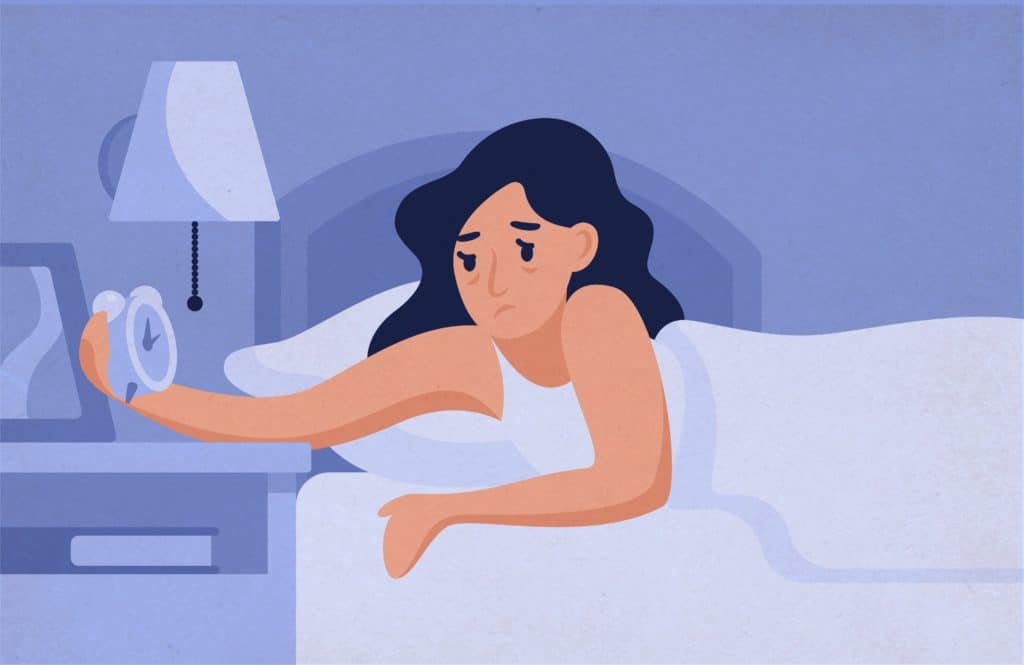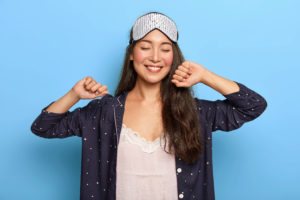
THE BOTTOM LINE
- Parasomnias are sleep disorders that cause unusual behaviors
- They can occur during all stages of sleep
- Treating your parasomnia will help you sleep better.
If you’re someone who suffers from strange-sleep behavior, you might want to read this article. Behaviors during sleep, such as sleepwalking or sleep talking, may seem harmless but these parasomnias can cause sleep disruptions. In some cases, they may even put you at risk of injuries. It’s common for people with parasomnias to not even realize they have a sleep disorder.
What is parasomnia?
Parasomnia refers to a group of different types of sleep-related disorders that cause abnormal and unusual behaviors while sleeping. Parasomnias are fairly common and often begin in childhood. Around 50% of people will experience some parasomnia at some point in their lives.
What are some types of parasomnias?
Some parasomnias are unique to your sleep stages, so they’ve been categorized into three groups:
Non-REM-related parasomnias (i.e. sleepwalking, sleep talking)
REM-related parasomnias (i.e. sleep-paralysis)
Other parasomnias not related to a specific sleep stage (i.e. exploding head disorder)
NON-REM-RELATED PARASOMNIAS
These parasomnias occur during the first three stages of your sleep cycle, but most commonly in slow-wave sleep, and are characterized by:
Recurring episodes of incomplete wakefulness
Limited responsiveness to others attempts to intervene
Limited cognitive processes occurring
Little to no memory of parasomnia episodes
These types of parasomnias are considered to be disorders of arousal because they’re caused by arousal in your body that forces you out of slow-wave sleep and into a limbo of sleep and wakefulness. They include:
Sleepwalking: Getting out of bed, walking around, and partaking in different types of bizarre behaviors while asleep (moving furniture, doing laundry, driving).
Sleep talking: Taking during sleep, from complete gibberish to full monologues.
Sleep bruxism: Teeth grinding or clenching of the jaw during sleep.
Night Terrors: Just like a nightmare, but without any dream activity.
Restless leg syndrome: Irresistible urge to move your legs during sleep due to feelings of itching, prickling, or crawling.
Elpenor syndrome (confusional arousal): Partially waking up in the middle of the night in a very confused state.
Sleep-related sexual behaviors (sexsomnia): Engaging in unusual sexual behavior during sleep.
Night eating syndrome: Nightly episodes of unusual eating during sleep.
REM-RELATED PARASOMNIAS
These parasomnias occur during your REM sleep period (or stage 4 sleep) and are characterized by:
Acting out vivid dreams
Easy to wake (and to remember the dream)
The experience for REM-related parasomnias can be vivid and extremely bizarre (sometimes very frightening). In some cases, you put yourself at an increased risk of sleep-related injuries. These parasomnias include:
REM-sleep behavior disorder: Acting out your dreams in real life.
Sleep paralysis: The feeling of being in a “mixed state of consciousness” characterized by hallucinations and atonia (temporary muscle paralysis).
Nightmare disorder: Recurrent, vivid nightmares.
Sleep-related painful erections: Painful erections during sleep.
OTHER PARASOMNIAS
These parasomnias can occur during any of your sleep stages and can also occur between the transition of wakefulness to sleep (and vice versa!). They include:
Exploding head syndrome: The sensation of your head exploding upon waking up.
Sleep-related hallucinations: Hallucinations affecting all of your senses that occur during sleep onset or upon waking up.
Sleep-related scratching: Injuring yourself via scratching during sleep.
What causes parasomnias?
Each parasomnia has its own set of potential causes but some of the common causes among parasomnias are:
Genetics: You’re more likely to suffer from parasomnia if there is a family history.
Sleep deprivation: Sleep deprivation can cause and increase parasomnia episodes.
Substance use: Alcohol, sedatives, and other medications can exacerbate the risk of parasomnias.
Stress: Stress leads to fragmented sleep, which can increase the chances of parasomnia episodes.
HOW TO TREAT PARASOMNIAS
1. CREATE A CONSISTENT BEDTIME ROUTINE
A consistent bedtime routine can help your brain to relax and de-stress. Try developing a 3-step strategy and implement it every day about 2 hours before you want to be sleeping. It might look something like this:
Mental decompression: Try meditating or deep breathing exercises. Check out our masterlist of relaxation techniques!
Take a warm shower: Research has found that this can help people fall asleep 36% faster.
Relax: Have some quiet time in a relaxing place. You could try building a hygge space!
2. AMP UP YOUR SLEEP ENVIRONMENT
Creating an amped-up sleep environment to go along with your sleep routine will help reduce the chances of parasomnias. Make sure if you implement these into your sleep environment that you also keep it a consistent part of your sleep routine.
Build a sleep sanctuary
Make sure your sleep environment is cozy and inviting by choosing colors that promote calmness, bedding that is comfortable and warm (without being sticky and sweaty), or aromas that aid in relaxation. Learn how to build a sleep sanctuary fit for royalty with our comprehensive guide.
Quick tips:
Clutter-free: A neat and tidy room induces immediate unconscious relaxation. Make the time to ensure your sleep environment is clutter-free.
Lower the room temperature: Set the temperature to 65℉ (18.3℃). Sleeping in a room with a cooler temperature can also improve sleep quality.
Sleep masks or blackout curtains: A darker environment helps to signal your melatonin production. Melatonin is a hormone in your body responsible for regulating your sleep cycle.
Earplugs or sound machines: If you sleep better in silence, make sure to have earplugs handy! Soothing sounds, such as white noise or pink noise (wind chimes or ocean waves) create a calming environment that can help you relax before falling asleep.
Some parasomnias have more specific treatments depending on the symptoms, so make sure if you’re suffering from one of the parasomnias in this article, that you look for specific treatment suggestions in one of our more specific parasomnia articles!






